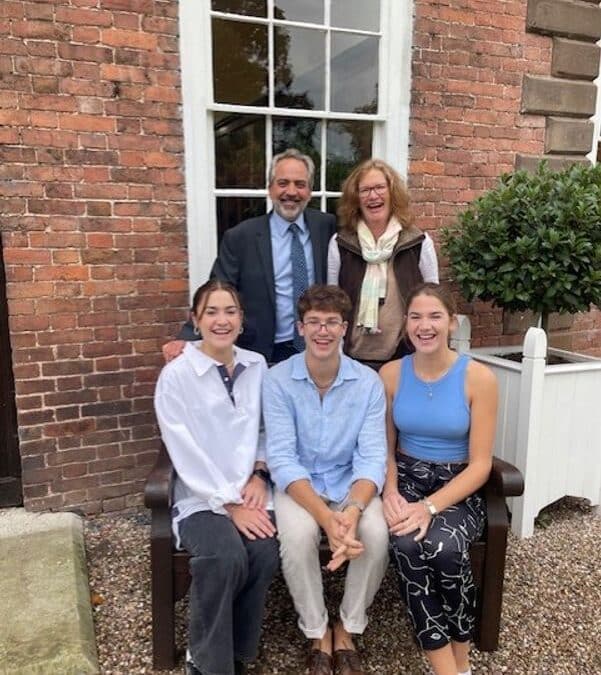A Shropshire family has run the TCS London Marathon in memory of a beloved husband and father, who died just days after a terminal brain tumour diagnosis.
David Bicker-Caarten 58, from Ashford in Shropshire, died in October 2023 after being diagnosed with four glioblastomas. His wife Clare, and three children Paige, Mary and Guy ran the world famous 26.2-mile course on Sunday (27 April) raising over £30,000 for the charity Brain Tumour Research.
Mary, 23, the first in the family to cross the finish line with a time of three hours and 52 minutes, said: “The training was intense, I had a lot of nerves leading up, it was very emotional thinking of Dad, and I had a few cries.
“I saw Mum, we crossed over at Tower Bridge, we had a little hand hold, I saw she was doing great so that put my mind at ease.
“The crowd was calling my name; it was so motivating they gave me that extra push. Seeing the finish line was great, getting the medal was amazing. We raised so much money, it meant so much it finally felt like we were doing something to help change the statistics of brain tumours. Dad would think we were insane, but I know he would be proud.”
Paige, 25, crossed the finish line in three hours and 55 minutes. She said: “The crowd were incredible, and it wasn’t as hard as I thought it would be. I love running so I loved my training and every single run I did beforehand. I saw my granny at one stop, which sparked a tear.
“I saw Mum on Embankment, which was really emotional, it was just so nice to have been able to do this and honour Dad with my family. I was so relieved when I saw the finish line, I did cry out of disbelief that I completed it.
“Dad never would have expected us to do this; he would have been so proud of us. As a family we have raised over £30,000, we need more funding we need more awareness, and I hope this helps to do that.”
David Bicker-Caarten had just begun his role as headteacher at Lucton School in Lucton, Herefordshire, where he’d taught for over a decade. But just weeks into the summer of 2023, he experienced neck pain, tingling in his arm, and pins and needles.
His wife, Clare, said: “On July 8, David booked to see his GP but there wasn’t a doctor available, so he was seen by a nurse practitioner who prescribed naproxen and sent him home. It didn’t sit well with me, I called the doctors and insisted on a second opinion.
“A week later, David saw a different doctor who referred him for an MRI on July 15. The referral for the MRI scan was delayed due to administrative errors. The doctor had gone on holiday and forgotten to request the referral. This oversight marked the beginning of a series of delays that plagued David’s journey.”
By July 29, David’s condition had worsened significantly. David was taken to Royal Shrewsbury Hospital where another MRI revealed a lesion on his brain. However, a clear diagnosis wasn’t forthcoming, with doctors attributing the lesions to a cyst or infection.
On August 1, David was given an urgent referral to the Neurology Department at Royal Stoke University Hospital. He was prescribed steroids to reduce inflammation, but David’s balance began to deteriorate.
Clare said: “I took matters into my own hands and drove him 2.5 hours to Royal Stoke University Hospital, where he was admitted immediately with what was diagnosed as liver failure, a result of both his neurological condition and the steroids he had been prescribed.”
David remained in Royal Stoke University Hospital for a month. In September, he underwent a biopsy which revealed four aggressive and inoperable glioblastomas, David and Clare were informed of the diagnosis on October 5. David was given just six months to live.
Clare said: “There was no time for treatment, no palliative planning, and no psychological preparation. For his children, who were just entering adult life, it was a trauma no family should endure.”
David died at home surrounded by his family on October 14, just nine days after receiving his diagnosis.
Since David’s death, his family has raised over £30,000 on their Just Giving page to fund vital research. Just 1% of the UK’s national spend on cancer research has been allocated to brain tumour research since records began in 2002, despite them killing more adults and children under 40 than any other cancer.
Clare, who completed the course in five hours and 42 minutes, said: “The support was amazing, people were calling my name, that made a huge difference especially when it became difficult. I am so proud of the kids, they did amazing. Reaching the halfway mark felt good, it made me realise that I can do this. Mile 16 was very difficult and the last six miles I put my music on and listened to songs that David and I used to enjoy; the memories and sadness pushed me forward. But seeing the finish line was a relief, it felt lovely, people kept saying “you’re nearly there” but it felt miles away! David would have thought we were completely bonkers! He would be really proud of us all, I’m proud of myself, can’t believe I’ve done it! Every mile was for David, and for the families still searching for answers, for hope, and for time that we never got.”
Clare’s son, Guy 21, completed the course in four hours and 27 minutes. He said: “It was amazing, the atmosphere and the crowd were just brilliant. The first half was ok, but the second half was difficult, when I finally saw the finish line it seemed to be getting farther away! I cried at times thinking of Dad. I saw other Brain Tumour Research runners which was nice and reminded me why this is so important. Dad would think we are lunatics!”
Carol Robertson, national events manager for Brain Tumour Research, said: “David’s story is heartbreaking and tragically all too familiar. The Bicker-Caarten family’s courage in the face of unimaginable loss is an inspiration to us all. Their marathon effort is not just about fundraising, t’s about demanding better. We were honoured to stand with them as they ran for awareness and increased funding in David’s name.”
Brain Tumour Research funds sustainable research at dedicated centres in the UK. It also campaigns for the Government and larger cancer charities to invest more in research into brain tumours in order to speed up new treatments for patients and, ultimately, to find a cure. The charity is the driving force behind the call for a national annual spend of £35 million in order to improve survival rates and patient outcomes in line with other cancers such as breast cancer and leukaemia.
To support the Bicker-Caarten’s fundraising campaign, visit: Brain Tumour Research: David’s page

